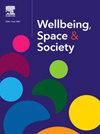Intersecting vulnerabilities: Health and wellbeing of older adults in Uganda during a global health crisis
IF 2.2
Q2 GEOGRAPHY
引用次数: 0
Abstract
The COVID-19 pandemic exacerbated vulnerabilities among older adults, particularly in Sub-Saharan Africa where structural inequities shape access to essential resources. Older adults are among the most vulnerable populations globally, yet their experiences during the pandemic remain understudied in resource-limited settings. Drawing on feminist political ecology of health and necropolitics, this research examined how pre-existing disadvantages, pandemic-induced disruptions, and structural inequities shaped health and wellbeing. We analyzed a cross-sectional survey (n = 288) of adults aged ≥60 years in rural Uganda in the acute phase of the pandemic (late 2021-early 2022), which documented access to essential resources to meet daily needs along with psychosocial health and wellbeing. Findings indicate some of the highest reported emotional distress (87 %) and low wellbeing (33). Contrary to expectations, being partnered or self-employed correlated with greater emotional distress, while WASH access indicators had limited influence on health outcomes. These patterns reflect how pandemic restrictions amplified household stresses and economic pressures, particularly for those with established social and economic resources, while limited WASH influence suggests acute pandemic stressors overshadowed chronic inadequacies. Satisfaction with government response also showed paradoxical effects, correlating with better psychosocial health but lower wellbeing, reflecting how interventions alleviated immediate anxieties while undermining economic stability. Overall, this research demonstrates how chronic structural inequities, rather than just acute emergencies, shape health outcomes among vulnerable populations. Aligned with the UN Research Roadmap, these findings suggest that addressing health inequities requires moving beyond emergency response toward systemic changes that enhance social protection and infrastructure access for older adults in resource limited settings.
交叉的脆弱性:全球健康危机期间乌干达老年人的健康和福祉
2019冠状病毒病大流行加剧了老年人的脆弱性,特别是在撒哈拉以南非洲,结构性不平等影响了老年人获得基本资源的机会。老年人是全球最脆弱的人群之一,但在资源有限的情况下,他们在大流行期间的经历仍未得到充分研究。利用女权主义健康和死亡政治的政治生态,这项研究调查了预先存在的劣势、大流行引起的破坏和结构性不平等是如何影响健康和福祉的。我们分析了一项横断面调查(n = 288),调查对象为大流行急性期(2021年底至2022年初)乌干达农村年龄≥60岁的成年人,该调查记录了满足日常需求的基本资源以及社会心理健康和福祉的获取情况。研究结果表明,一些人报告的情绪困扰最高(87%),幸福感低(33%)。与预期相反,成为伴侣或自雇人士与更大的情绪困扰相关,而获得WASH指标对健康结果的影响有限。这些模式反映了大流行限制如何放大了家庭压力和经济压力,特别是对于那些拥有既定社会和经济资源的家庭,而讲卫生运动的有限影响表明,急性大流行压力掩盖了长期不足。对政府反应的满意度也显示出矛盾的影响,与更好的社会心理健康相关,但幸福感较低,反映出干预措施如何缓解了眼前的焦虑,同时破坏了经济稳定。总的来说,这项研究表明,长期的结构性不平等,而不仅仅是急性紧急情况,如何影响弱势群体的健康结果。这些发现与联合国研究路线图一致,表明解决卫生不平等问题需要超越应急反应,转向系统性变革,在资源有限的环境中加强老年人的社会保护和基础设施获取。
本文章由计算机程序翻译,如有差异,请以英文原文为准。
求助全文
约1分钟内获得全文
求助全文
来源期刊

Wellbeing Space and Society
Social Sciences-Social Sciences (miscellaneous)
CiteScore
2.70
自引率
0.00%
发文量
46
审稿时长
124 days
 求助内容:
求助内容: 应助结果提醒方式:
应助结果提醒方式:


